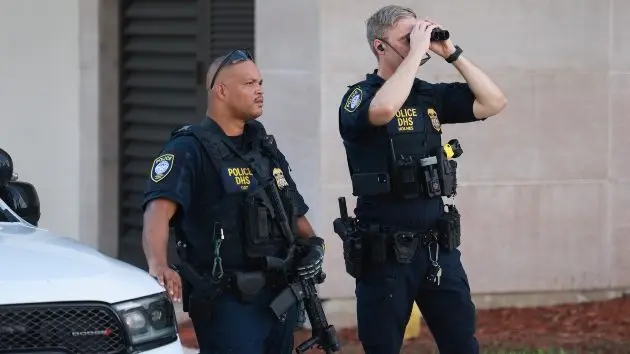
(WEST PALM BEACH, Fla.) — Ryan Routh, the man accused of trying to kill Donald Trump on his West Palm Beach golf course last year, is defending himself before a Florida jury.
Routh, who is representing himself despite lacking any legal education or experience, plans to call three witnesses on Monday — a gun expert and two character witnesses — as he tries to make a case why a jury should spare him from the possibility of spending the rest of his life in prison.
His defense case is expected to take about half the day, with closing arguments currently scheduled for Tuesday.
Routh has broadly described his defense strategy as emphasizing his “gentleness, peacefulness, and nonviolent caring for humanity,” according to court filings.
Among the exhibits Routh plans to use are a design for a DIY skatepark, videos and photos showing him recruiting and fundraising for the Ukrainian military, a photo of a flash mob he organized, and a church bulletin from 1980 when he was awarded an Eagle Scout award.
U.S. District Judge Aileen Cannon — who has repeatedly clashed with Routh over his unusual courtroom tactics — has curtailed much of Routh’s defense. She blocked many of his proposed witnesses, including an ex-girlfriend and several Palestinian scholars, and prohibited him from arguing that his actions were justified or that he would not have followed through with the assassination attempt.
Routh’s unorthodox defense case follows seven days of testimony from 38 witnesses called by federal prosecutors seeking to prove Routh came within a few hundred yards of killing then-candidate Trump on Sept. 15. Jurors heard from the Secret Service agent who said he spotted Routh hiding in the bushes of Trump’s golf course with an assault rifle, the man who illegally sold the gun to Routh, and a series of law enforcement witnesses who tied Routh’s fingerprints and DNA to the gun abandoned at the crime scene.
FBI agents also testified that Trump would have been less than 130 feet from Routh had Routh not been spotted by a Secret Service agent. Routh’s rifle, they argued, can hit a target ten times that, and the shot could have been made without a scope.
Two brothers who worked with Routh also testified about receiving a box from him in April 2024 — five months before the alleged assassination attempt — that contained wires, pipes, and bullets. After Routh’s arrest, the brothers said they opened the box to find a 12-page letter that prosecutors argue amounts to a confession from Routh.
“This was an assassination attempt on Donald Trump, but I failed you. I tried my best and gave it all the gumption I could muster. It is up to you now to finish the job; and I will offer $150,000 to whomever can complete the job,” the handwritten letter said.
Routh has argued that the letter does not describe the alleged assassination attempt.
At the conclusion of the government’s case on Friday, Routh argued that prosecutors had failed to prove their case and that Judge Cannon, who previously oversaw and dismissed one of Trump’s criminal cases, should toss the case. Routh claimed that the area in the bushes where he was allegedly found was a public area where anyone could carry a gun.
“They maybe proved that someone was outside the fence with a gun, but the gun was never fired,” Routh argued.
Judge Cannon denied Routh’s motion, concluding that prosecutors have provided enough evidence to let the jury decide the case.
Copyright © 2025, ABC Audio. All rights reserved.